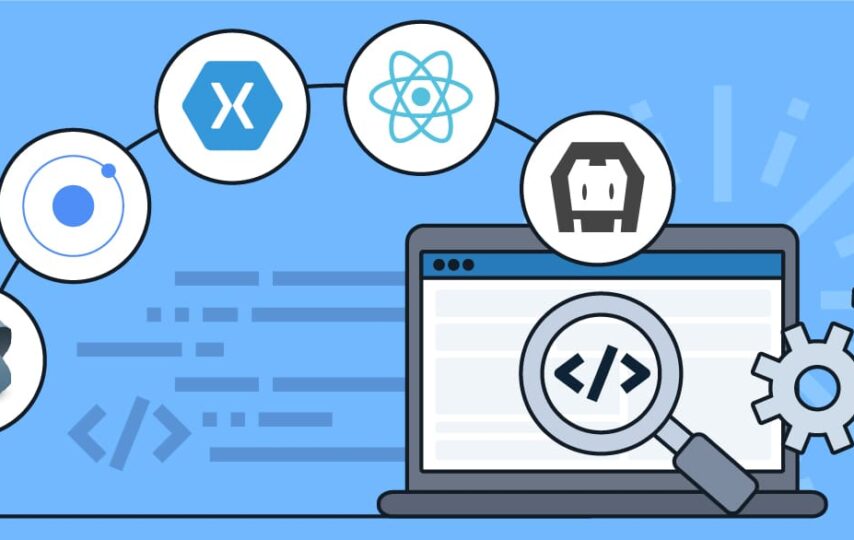App developers and investors are always on a hunt for tools that maximize the productivity and stability of their businesses while effectively optimizing the invested time and cost.
This is where cross-platform app development services come into the picture.
Cross-platform frameworks are compiled with innumerable merits that significantly uphold all demands of app developers and entrepreneurs, which is why it would generate massive revenue streams in the time to come.
Also, since it lets mobile app development companies extend their app services and technicalities beyond the operating system barriers, cross-platform frameworks allow them to cater to a growing number of audiences.
Today, I would present a list of a few of the most used cross-platform app development frameworks. However, before jumping down to the list, let’s get our facts clear about what is cross-platform app development frameworks.
What is Cross-Platform Mobile App Development?
A cross-platform apps development framework is a tool that allows developers to build native-like applications for multiple mobile operating systems like Android, iOS, and Windows, etc., using a single codebase.
As cross-platform frameworks come in numerous benefits, these tools allow app development businesses to expand their consumer reach and maximize their chances to survive within the technologically disruptive world.
Briefly describing some of the primary benefits of cross-platform frameworks that enable you to sustain your businesses in this Darwinian world, it includes;
Benefits of Cross-platform App Development Tools
- Leveraging a mobile cross-platform development approach enables you to extend your target audience and market reach by developing a single app for multiple platforms.
- Using a cross-platform app framework enables you to optimize the overall cost invested in developing an app.
- The time spent on developing also cuts down, enabling it to reach the market relatively quickly.
- The process of maintaining and deploying mobile apps speeds up.
- Cross-platform app development frameworks always work well with external plugins and libraries. Therefore, they are easily compatible with cloud services.
Now that we have developed a clear understanding of cross-platform mobile app development and the benefits of opting for cross-platform frameworks let’s look at the list of cross-platform tools.
8 Best Cross-platform Tools for Mobile App Development
Image Source: Statista
The image above gives a clear idea of some of the most used cross-platform mobile app development frameworks used by app developers worldwide.
The list below would give a detailed overview of what features make these mobile cross-platform tools most preferred. The sequence of the list does not reflect any order of ranking for the mentioned cross-platform frameworks.
- React Native
Image Source: React Native
React Native is an app development framework launched by Facebook in 2015 that leverages JavaScript at its core.
Initially developed for iOS, the framework is now widely used to develop multi-platform mobile apps that provide a native-like feel, productivity, and usability. In addition, it allows developers to code in languages like Objective C, Swift, and Java to develop dedicated app modules.
Advantages of React Native
- Supports more than 80% code reusability across different devices. This increases production efficiency and reduces the time required to launch the app.
- Hot Reloading feature allows developers to incorporate and observe live changes in the code without saving them.
- The platform primarily focuses on UI enabling developers to design highly interactive interfaces.
- React Native is a free, open-source platform that comes with a large community, maximizing the learning margin for beginners.
Mobile Apps Based on React Native
- Bloomberg
- Tesla
- Skype
- Flutter
Image Source: Google Images
Flutter is a Software Development Kit that is majorly employed to develop cross-platform mobile applications for Android, iOS, windows, etc.
Developed by Google, the platform was officially released in 2017 as an open-source UI SDK. It employs Dart Programming, an easily understandable and applicable language for Java and JavaScript developers.
A survey by Developers places Flutter as the third-most loved app development framework. Scrolling back to the graph above, it clearly depicts that the use of flutter for cross-platform app development significantly increased in 2020 – ultimately affecting the market share of other mobile cross-platform development tools.
Advantages of Flutter
- Flutter is an ideal platform for developing Minimum Viable Product for an app. It saves the time and efforts invested in developing two separate entities for apps
- Flutter also comes in with Hot reloading feature that enables developers to view and optimize code changes within seconds.
- Flutter employs Object-Oriented Programming (OOP) to develop mobile apps with Dart language convenient for app developers.
- It comes with a dedicated graphics engine to create interactive user interfaces.
Mobile Apps Based on Flutter
- Google Ads
- Alibaba
- Reflectly
- Cordova
Image Source: Google Images
Apache Cordova is another commonly used mobile app development framework based on standard web development technologies like HTML, CSS, and JavaScript.
Acquired by Adobe, the framework develops hybrid cross-platform applications; these apps are neither completely native nor web-based. Instead, apps based on Cordova execute within wrappers and rely on the standard API bindings to access the data, sensor, and network capabilities dedicated to each device.
Advantages of Cordova
- The tool is based on standard and well-known languages like HTML, CSS, and JavaScript.
- Cordova has greater compatibility with third-party plugins and external APIs to incorporate additional app functionalities. The framework also supports using custom plugins.
- The command-line syntax of the framework is easy to use and learn.
- Mobile applications developed on Cordova are easy to develop, set up, and deploy to multiple platforms.
- Ionic
Image Source: Google Images
Ionic is another potent HTML5 Software Development Kit that fundamentally employs Apache Cordova to support cross-platform app development.
Licensed under MIT, Ionic majorly emphasizes developing SaaS UI-centric applications that are hybrid and support maximum user interaction. The framework uses a dedicated IDE, Ionic Studio. Also, it supports developing progressive web apps.
Advantages of Ionic
- Ionic is specifically based on the SaaS UI Framework for mobile operating systems to develop strong user interfaces.
- The tool is compatible with external plugins, tools, and UI components.
- Ionic is a must-have tool for businesses and prospects that require a continuous flow. Moreover, the framework allows you to have automated mobile app development alongside CI-CD.
- The tool has strong community support, enabling easy learning tools and developing cross-platform mobile applications.
Mobile Apps Based on Ionic
- Pacifica
- NASA
- Diesel
- JustWatch
- Xamarin
Image Source: Google Images
Xamarin is one of the best cross-platform app development frameworks powered by Microsoft.
The tool employs .net code to develop native-like applications for multiple mobile OS, including Android, iOS, Amazon phone, etc. Similarly, Xamarin offers developers extensive compatibility for PC and MAC devices and comes in with different features like code editing, UI design, and debugging.
Advantages of Xamarin
- The tool ensures a native-like mobile app development experience for users by providing native interfaces that appear as users wish to see them.
- The tool supports code reusability, with approximately 75% of the entire code being used for developing mobile apps for different platforms.
- The framework has a wide community of over 60,000 developers from more than 3,700 companies.
- The tool is a single tech stack for faster development and deployment of mobile app development.
Mobile Apps Based on Xamarin
- Alaska Airlines
- Fox Sports
- BBC Good Food
- American Cancer Society
- Unity
Image Source: Google Images
Unity is another open-source web app development tool majorly popular for its incredible graphics quality.
The cross-platform tool allows developers to export apps and games to 17 different platforms, including Microsoft, Android, iOS, Xbox, etc. It helps developing games that are graphically strong, technology-oriented, and incorporate real-time performance.
Advantages of Unity
- Unity support analyzing user analytics and share apps on social media.
- The framework has a Unity Connect platform –a wide community of people who code on Unity, enabling them to find solutions to their code-related queries.
- Unity consists of several dedicated tools that help in easy code writing and debugging.
Mobile Apps/Games Based on Unity
- Hitman Sniper
- Shadow Fight 3
- Monument Valley
- PhoneGap
Image Source: Google Images
PhoneGap is another mobile app development tool for multiple mobile OS powered by Adobe and employs Apache Cordova as the functional core.
The framework is an open-source platform that works with HTML, CSS, and JavaScript to develop mobile and web applications. Since Apache Cordova powers the tool, it comes with a built-in tool to read, debug, and inspect design and development codes.
Advantages of PhoneGap
- A major benefit of using PhoneGap for multi-platform app development is that it is easy to learn and understand the built-in tools.
- The framework also provides cloud services solutions to develop, store, and deploy app directly.
- PhoneGap uses intuitive desktop platforms for developing mobile apps, which are then served to mobile devices connected to the desktop.
- PhoneGap also leverages the wide community of Apache Cordova and also provides compatibility to third-party plugins.
Mobile Apps Based on PhoneGap
- FanReact
- TripCase
- Wikipedia
- NativeScript
Image Source: Google Images
NativeScript is another commonly preferred mobile cross-platform framework preferred by developers for Write Once, Run Anywhere (WORA) methodology.
NativeScript one of the commonly used platforms because it brings along a wide library of native APIs and plugins. This inevitably eliminates the need to install and run third-party plugins and gives the user an entirely dedicated mobile app development experience.
Advantages of NativeScript
- NativeScript renders developing intuitive and native-like graphical user interfaces without the need for WebView. Instead, developers define once, and then the framework adapts to it automatically.
- The framework leverages Angular and TypeScript programming approaches, enabling easy app development
- It enables easy access to native iOS and Android APIs, enabling smooth incorporation of Native-like language features for developers.
Mobile Apps Based on NativeScript
- BitPoints Wallet
- Strudel
- Dwitch
Wrapping Up
Cross-platform app development is one of the leading development trends in the industry for all the right reasons. While it comes along with plenty of benefits for app development businesses, it has been growing popular among developers and app users.
Features like UI uniformity, greater app compatibility, and code reusability, cross-platform development services are growing bigger and better. If you are also interested in developing cross-platform applications, you are not alone.
And, therefore, this article has brought you some of the widely used frameworks you can employ to create mobile applications that have extensive user approaches and may yield potential outcomes for your business.







